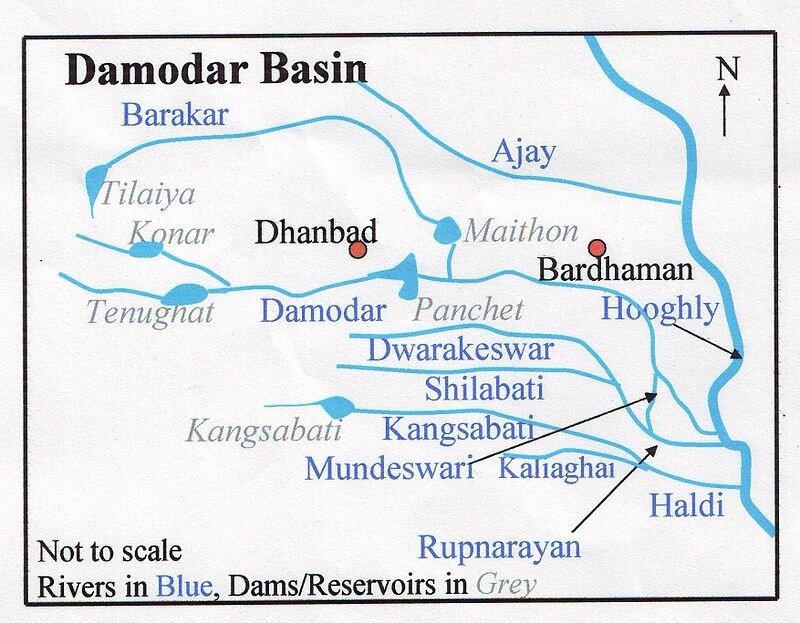West Bengal Major Irrigation and Flood Management Project | 16 May 2020
Why in News
Recently, the Government of India, the Government of West Bengal, the Asian Infrastructure Investment Bank (AIIB) and the World Bank have signed a loan agreement for a project titled ‘West Bengal Major Irrigation and Flood Management Project’.
- The project includes the improvement in irrigation and flood management in the Damodar Valley Command Area (DVCA).
Key Points
- West Bengal Major Irrigation and Flood Management Project aims to improve irrigation service delivery, strengthen flood risk management and improve climate change resilience in the project area.
- It is intended to benefit about 2.7 million farmers from five districts of West Bengal.
- The project comprises four components:
- Irrigation Management : It will improve the management of the Damodar Valley Command Area (DVCA) irrigation scheme to improve service delivery, performance monitoring and irrigation efficiency evaluation.
- Modernization of Irrigation Infrastructure : It will invest in the modernization of irrigation infrastructure at main, branch, distributary and minor canal levels.
- Flood Management : It will invest in structural measures to reduce flooding in the project area. It will also include the implementation of the recommendations of the Dam Safety.
- Project Management : It will strengthen the implementation agency’s capacity for project management, including financial management, monitoring and evaluation, and environmental and social safeguards management and communication. It will also support a communication campaign to inform stakeholders on the importance of water use efficiency.
- The total value of the project is $413.8 million, co-financed between the International Bank for Reconstruction and Development (IBRD) ($145 million), the Asian Infrastructure Investment Bank ($145 million) and the Government of West Bengal ($123.8 million).
- International Bank for Reconstruction and Development (IBRD) is a part of the World Bank Group that provides financial products and policy advice to help countries reduce poverty and extend the benefits of sustainable growth to all of their people.
Background
- The Damodar Valley Command Area is in the need of modernization.
- The command area is the area around the dam/ project, where the area gets benefits from the dam, such as irrigation water, electricity, etc. It is an area which can be irrigated from a project and is fit for cultivation.
- In other words, it is the area around a dam which is under its command as an irrigation source.
- It faces key challenges including degradation of infrastructure, inadequate irrigation management, poor quality of service delivery and inefficient irrigation.
- Due to above reasons, the farmers in the area are forced to extract groundwater, which increases the costs of cultivation.
- Moreover, the Lower Damodar basin area is historically flood-prone. As this area lacks the infrastructure to protect against recurrent flooding, on average, 33,500 hectares of the cropped area and 461,000 people are affected annually due to recurrent flooding in the area.
Damodar River
- The Damodar river rises in the Palamu hills of the Chota Nagpur plateau in the state of Jharkhand.
- It passes through two Indian states namely, Jharkhand and West Bengal.
- The Damodar occupies the eastern margins of the Chotanagpur Plateau where it flows through a rift valley and finally joins the Hugli.
- The Barakar river is its main tributary.
- Due to the devastating floods caused by the Damodar river and its tributaries in the plains of West Bengal, it is also known as the ‘sorrow of Bengal’.
Damodar Valley Corporation
- The Damodar Valley Corporation was established in 1948 as the first multipurpose river valley project of independent India.
- Under this project, four dams were constructed namely,
- Tilaiya Dam: It has been constructed across the Barakar river at Tilaiya in Koderma district of Jharkhand.
- Konar Dam: The Konar dam has been constructed across the Konar river—a tributary of the Damodar River in the Hazaribagh District of Jharkhand.
- Maithon Dam :It has been constructed across the Barakar river near the confluence of Barakar with Damodar river.
- Panchet Dam: The Panchet dam has been constructed across the Damodar river, about 20 km south of the Maithon Dam.
